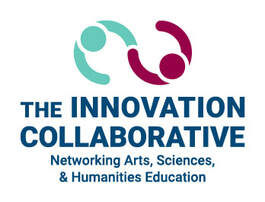History
The Innovation Collaborative, established in Washington, D.C., in May 2013, is one outcome of the SEAD (Sciences, Engineering, Arts, and Design) Network. The SEAD Network is a community of advocates for the importance and value of research and creative work across the arts and sciences. It was an initiative funded by the National Science Foundation (NSF), and grew out of meetings co-organized by the NSF, National Endowment for the Arts, and National Endowment for the Humanities.
WHY
A major project of the SEAD Network was the call for and analysis of white papers related to current research and creative work across the arts and sciences. The Innovation Collaborative seeks to take this research and further explore its applications (and implications) for learning in K-12 classrooms and informal learning environments.
A major project of the SEAD Network was the call for and analysis of white papers related to current research and creative work across the arts and sciences. The Innovation Collaborative seeks to take this research and further explore its applications (and implications) for learning in K-12 classrooms and informal learning environments.
HOW
Drawing on the combined expertise of leading national arts, sciences, and humanities institutions and researchers, the Innovation Collaborative ensures it can have impact across the spectrum of formal and informal learning environments. To ensure continuity with the SEAD Network, some of its members help lead the Innovation Collaborative by participating on the Board of Directors and the Advisory Board.
The Innovation Collaborative’s diverse membership is successfully bridging disciplinary divides to develop its goals, and initiatives, such as the Effective Practices project . By working continually to build shared vocabulary, goals, and strategies, we develop rich mutual understanding and cooperation.
Drawing on the combined expertise of leading national arts, sciences, and humanities institutions and researchers, the Innovation Collaborative ensures it can have impact across the spectrum of formal and informal learning environments. To ensure continuity with the SEAD Network, some of its members help lead the Innovation Collaborative by participating on the Board of Directors and the Advisory Board.
The Innovation Collaborative’s diverse membership is successfully bridging disciplinary divides to develop its goals, and initiatives, such as the Effective Practices project . By working continually to build shared vocabulary, goals, and strategies, we develop rich mutual understanding and cooperation.
WHAT
Since its inception in May, 2013, the Innovation Collaborative has accomplished many goals. Among these are:
Since its inception in May, 2013, the Innovation Collaborative has accomplished many goals. Among these are:
- Conducted two rounds of strategic planning
- Developed ongoing, successful and productive collaborations among a number of diverse institutions and disciplines that support Collaborative goals
- Determined that there is a need for data to document the impact of the arts/science/humanities intersections on creative and innovative thinking in K-12 and informal learning settings
- Developed an active Research Thought Leader group made up of nationally-known researchers representing the arts, sciences and humanities, as well as neuroscience and creativity
- Implemented its multi-year national research project: identifying K-12 effective practices that support promote creative and innovative thinking at the intersections of the sciences, arts, and humanities
- Delivered presentations about the Collaborative’s work at key national conferences: American Educational Research Association (AERA), Americans for the Arts (AFTA), Association of Science-Technology Centers (ASTC), Educational Theatre Association (EdTA), National Science Teachers Assn. (NSTA), National Art Education Association (NAEA), National Assn. of Gifted (NAGC), and National Association for Research in Science Teaching (NARST), US Science and Engineering Festival.
- Raised seed funds and also received the following grants from the National Endowment for the Arts:
- $20,000 to convene the Research Thought Leaders
- $10,000 to study effective teacher professional development at the arts/science/humanities intersections
- $10,000 to broaden the study of effective teacher professional development at the arts/science/humanities intersections
